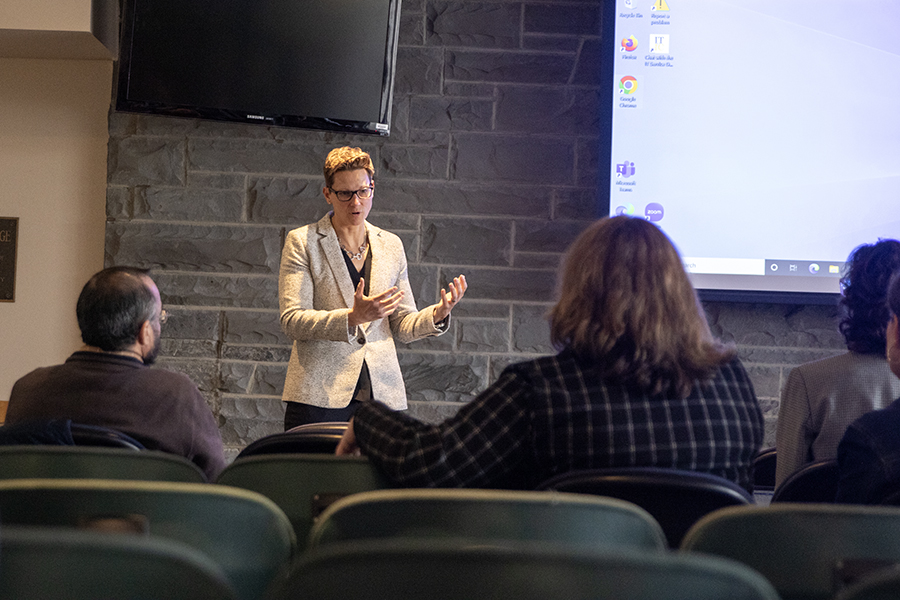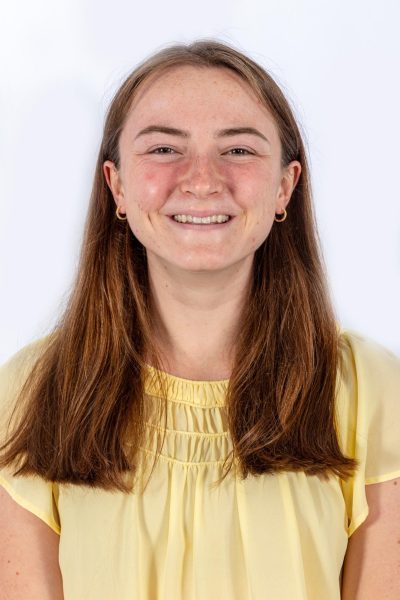With high administrative turnover in recent years, Ithaca College has conducted many searches to fill administrative positions, each search offering a different level of engagement with the campus community.
The college has conducted a variety of administrative searches within the last year. In some searches, the college held open sessions with the campus community, while other searches were confidential. The college used a search firm to find candidates for some searches but filled some positions without outside guidance.
Kirra Franzese, associate vice president and chief human resources officer, said the college designs each search differently based on the position. Franzese said that for most searches, the college forms a search committee composed of faculty, staff and students. The search committee establishes a list of skills and qualities preferred in candidates, speaks with candidates in initial interviews by phone or Zoom call and selects finalists to visit campus. After the campus visits, the search committee presents their recommendation to the appropriate hiring authority, who makes the final decision about which candidate to hire.
Franzese said that for senior-level administrative positions — deans, vice presidents and presidents — the college uses a search firm, a group that helps the college identify and recruit competitive candidates.
“Search firms will do … everything from just developing the candidate pool to helping us write the leadership profile, to checking references to coordinating travel for candidates, to coordinating interview schedules,” Franzese said.
Tim Downs, vice president for finance and administration and chief financial officer, said the college frequently uses NES Searches for enrollment and admissions positions and Isaacson Miller for more general education positions. Vice presidents can also make a formal request to HR to manage searches internally if they feel that they can find a qualified candidate or have already identified a candidate from within the college.
Downs said each search firm charges the college a percentage of the candidate’s first-year salary. Most firms’ cost ranges from 20-40% of the first-year salary depending on the position.
Downs said the cost of using a search firm does not add financial stress to the college, even with high administrative turnover and frequent searches. During a search, the position is open and the college does not pay an administrator’s salary, which creates a vacancy savings.
“Given the length the searches take, I would say more often than not … we see more savings than we do the fee we have to pay for [the firm],” Downs said.
Downs said the college likes to build relationships with search firms and does not switch firms based on cost, especially because the difference in cost between firms is usually minimal.
“Our goal is we want the best pool of candidates we can get,” Downs said. “We typically stay with a consistent firm for at least a period of time so they can get to know us, what makes us tick, who we are, so they can go out and appropriately source from a diverse pool of candidates that are going to be good fits for Ithaca College.”
Open vs. confidential searches
For some positions, like the three dean searches conducted in 2021–2022, the college held open sessions with the campus community and provided updates throughout the search. For other positions, like the vice president for philanthropy and engagement and the vice president for marketing and communications, the college posted an announcement once they hired a candidate.
Franzese said the search firm often identifies candidates who already have high-level administrative positions and who are not looking for a job. Candidates sometimes ask for discretion in the search process because they do not want to impact their current position. The college makes searches confidential when a lack of privacy would make it difficult to attract these qualified candidates.
“Ideally, we would love to have all of our searches to be open to the campus community,” Franzese said. “Oftentimes, we have to make that decision that is going to be closed versus open to be able to attract and retain that candidate pool of really strong candidates to hopefully have a successful hire at the end.”
Provost Melanie Stein said via email that the dean searches included open sessions with the campus community, but the college shared information about the candidates prudently.
“In the dean searches, finalists’ names and materials were made available to the wider IC community, access restricted to those with IC netpass, 24 hours prior to their on-campus interview, and the finalist interviews were all conducted within a single week,” Stein said. “The idea is to balance the desire of the community to weigh in on candidates and minimize publicity outside of the institution.”
Current searches
Since May 1, the college has hired Laine Norton as vice president for philanthropy and engagement, Mark Eyerly as vice president for marketing and communications and Crissi Dalfonzo as director of LGBTQ Education, Outreach and Services. Several administrators have also left the college since May 1, including Bryan Roberts, former associate dean of the Roy H. Park School of Communications; Ivy Walz, former associate dean of the School of Music, Theatre and Dance; Mame Ndiaye, former assistant director of New Student and Transition Programs; and Linda Petrosino, who retired from her position as dean of the School of Health Sciences and Human Performances.
In March 2023, the college held open sessions with finalists for the new vice president of enrollment and student success position. In a May 2023 Intercom post, Cornish announced that the search would be relaunched in Fall 2023 to find an individual who could meet the college’s needs for enrollment. The college will continue to use NES Searches to find more candidates.
Downs said the college will not pay an additional fee to NES Searches to relaunch the search because the college pays a fixed percentage of the position’s salary no matter how long the search takes or how many times the college needs new candidates.
Claire Gleitman, dean of the School of Humanities and Sciences, is the co-chair of the search committee for vice president of enrollment and student success. Gleitman said via email that the search committee has not yet discussed whether the college will hold open sessions for the campus community to meet with the new finalists.
Jack Powers, professor of Media Arts, Sciences and Studies, said he has served on more than 10 search committees, including the current search for vice president of enrollment and student success. He said the search committee always speaks with finalists when they visit the campus, regardless of whether the search is open or closed.
Powers said there is typically not a high turnout when the college invites the campus community to attend open sessions.
“The number of people that typically show up to [sessions with candidates] is roughly the same for when it’s open versus when it’s confidential,” Powers said.
Powers said that even when community members attend sessions, the search committee members usually engage with the candidates most.
Sophomore Caleb Cackowski said he thinks the college should change the way that it advertises open sessions.
“I’ve definitely seen emails before where the president puts out like, oh, a candidate has been selected for this thing, and we’re having these sessions,” Cackowski said. “I think that’s the kind of thing that people aren’t going to because they don’t feel they know enough about it … [and] everyone assumes someone else would go to it.”
Cackowski said he serves on Student Governance Council as vice president of communications. He feels that the college could get more students engaged in the searches if they invited SGC members to attend open sessions and bring feedback from their constituents.
Powers said that whether the searches are open to the campus community or confidential, the faculty members who serve on the search committees ensure that they advocate for their school communities and bring their colleagues’ concerns to the search process.
“I know our culture, and so I try to take that knowledge and find a candidate who I think would respond well and work well with Park faculty,” Powers said. “Ithaca College is its people and if you have good people, you’re going to have a good college.”








